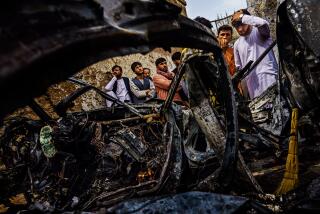In Afghanistan, Anti-Taliban Forces See U.S. Airstrikes as Falling Short
- Share via
JABAL OS SARAJ, Afghanistan — In the shabby teahouses of northern Afghanistan, men with Kalashnikovs gathered Monday to drink sugary green tea, talk about the U.S. attack on the enemy Taliban, to pray and remember the dead.
This day, the talk turned to one of the most recent opposition casualties in a civil war suddenly reignited by the American-led campaign against the Taliban. Said, 18, was killed in an intense exchange of fire a few hours after the U.S. airstrikes began.
He was laid to rest Monday by his family and comrade fighters, amid platitudes that reflect not only the long years of war in Afghanistan but also the fatalism that enables moujahedeen to face death bravely.
Fresh from the burial of his fallen colleague, Del Agha, 25, dropped into Jabal os Saraj for his morning cup of green tea Monday before his return to the front line that evening.
In Afghanistan, the teahouse is the soul of every bazaar, a place for prayer, gossip, reflection. It is here that moujahedeen come to rest between fighting and to take nourishment.
When he sits down to eat his bowl of plov, rice and meat, the typical Afghan male tenderly lays aside his Kalashnikov assault rifle, a trusted friend. When he prays, the weapon is usually placed before him as he touches his forehead to the ground.
As he sipped his tea, Del Agha seemed perplexed by the question of whether he feels fear in battle. “I’m not afraid of death. For the sake of our people. For the sake of our country.”
Moujahedeen fighters such as Del Agha see their fates as something only God can determine. To them it is as pointless to try to avoid their fate as it is to fear it.
The problem for the anti-Taliban fighters is that they face tough foes on the other side of the front line who are equally willing, even eager, to sacrifice their lives in war.
Such warriors are not afraid of bomb strikes of the kind the U.S. launched Sunday and Monday, the opposition Northern Alliance says.
After the initial jubilance when the world’s most powerful military forces attacked their enemy, there was a sense of anti-climax among opposition fighters, many of whom said they expected stronger attacks.
“The bombing should go on and on constantly,” said Maulana Said Hel, a commander near Bagram airport.
Nur Agha, 28, from another unit, said moujahedeen fighters were “very disappointed” at the “weakness” of the American attack.
“To get rid of terrorism, you’ll have to act more resolutely. America should bomb and bomb and bomb.
“We expected more from the Americans. Such operations cannot frighten Afghans. We’re used to such weak operations like this one since the times of the war against the Soviets,” he said, referring to Moscow’s 1979-89 occupation.
The opposition is planning to launch a big offensive after the U.S. strikes are over, hoping that the Taliban will be demoralized and disorganized. And the battles that erupted after the start of the U.S. campaign were the most intense in months.
Said’s unit came under fierce fire near Bagram, 22 miles north of Kabul, the capital, on Sunday. Hit by machine-gun fire in a trench, he was killed immediately. His friends brought his body home to his parents Monday.
Said was a young man with a strong competitive edge: He always wanted to be first at whatever he did. And he became one of the first to fall in the renewed fighting with the Taliban.
Del Agha told Said’s parents that his friend’s fate had been “all in the hands of Allah.”
The victim’s father responded with similar platitudes: “It had to be. It was for our country.”
Said’s mother looked on, tears streaming down her face.
Sitting in the teahouse at Jabal os Saraj some hours later, Del Agha seemed to struggle to find words to describe his friend.
“He was a typical moujahedeen. He was good. He was always first,” he said. Prompted further, he added, “He was always glad. He was a jovial sort. He worked hard and prayed to Allah.”
The landscape in Afghanistan’s rugged, razorback mountains is planted with green or red flags marking the places where Islamic warriors fell in battle.
With the Taliban and Northern Alliance gearing up for more battles now, it seems that many more flags will spring up on the soil of Afghanistan.
*
Special correspondent Sergei L. Loiko contributed to this report.
More to Read
Sign up for Essential California
The most important California stories and recommendations in your inbox every morning.
You may occasionally receive promotional content from the Los Angeles Times.










